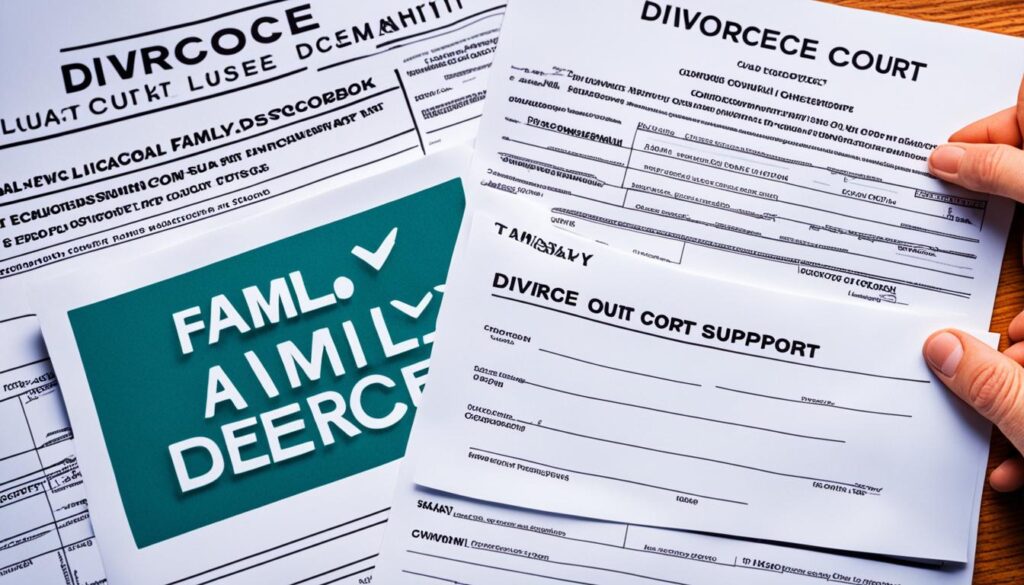Welcome to our in-depth guide on how to navigate the process of getting divorced in the US Virgin Islands. Whether you are thinking about divorce, currently going through one, or just want to learn more about the legal process, this guide has all the information you need. We will cover everything from the legal requirements to the available options, ensuring you have all the information you need.
Key Takeaways
- Getting divorced in the US Virgin Islands involves understanding the legal process and requirements.
- Options for divorce in the US Virgin Islands include mediation, reconciliation, and traditional court proceedings.
- Child custody, property division, and spousal support are important considerations in a divorce.
- Consulting with a licensed attorney can provide guidance and protect your rights throughout the process.
- Proper documentation and following specific court guidelines are essential when filing for divorce in the US Virgin Islands.
Requirements for Filing for Divorce in US Virgin Islands
In order to file for divorce in the US Virgin Islands, couples must meet certain requirements and establish grounds for the dissolution of marriage. Understanding these requirements is essential to ensure a smooth and successful divorce process.
Grounds for Divorce:
To file for divorce, couples in the US Virgin Islands need to establish valid grounds for the dissolution of their marriage. Some common grounds for divorce in the US Virgin Islands include:
- Irretrievable breakdown of the marriage
- Adultery
- Conviction of a felony
- Abandonment
- Domestic violence
- Living separately for a certain period of time
- And more
Filing Fee:
When filing for divorce in the US Virgin Islands, there is a filing fee that must be paid. As of the latest information available, the filing fee for a divorce petition is Fifty Dollars ($50.00). This fee may be subject to change, so it’s important to verify the current amount at the time of filing.
By meeting the necessary requirements and establishing valid grounds for divorce, couples can initiate the legal process and take the first steps towards ending their marriage in the US Virgin Islands.
Child Custody in US Virgin Islands Divorce Cases
When it comes to child custody in US Virgin Islands divorce cases, the court prioritizes the best interests of the child. Various factors are taken into consideration to ensure that the custody arrangement promotes the well-being and happiness of the child.
The court considers the child’s preference, if they are old enough to express it, as well as the ability of each parent to maintain a loving and nurturing relationship with the child. The child’s adjustment to their home and school environment, as well as the mental and physical health of both the child and parents, are also taken into account.
If it is in the best interest of the child, the court may award joint custody, allowing both parents to share the responsibilities and decision-making authority. Joint custody ensures that the child maintains a close relationship with both parents, promoting their emotional well-being.
Furthermore, US Virgin Islands recognizes the important role of grandparents and great-grandparents in a child’s life. In certain circumstances, the court may grant them visitation rights, allowing them to maintain an ongoing relationship with the child.
To better understand the factors considered in child custody cases and the legal rights of each parent, it is advisable to consult with an experienced family law attorney who can guide you through the process and advocate for the best interests of the child.
Factors Considered in US Virgin Islands Child Custody Cases
| Factors | Description |
|---|---|
| Child’s Preference | The court may take into account the child’s preference if they are mature enough to express it. |
| Parental Relationship | The ability of each parent to maintain a loving and nurturing relationship with the child is considered. |
| Child’s Adjustment | The child’s adjustment to their home and school environment is evaluated. |
| Mental and Physical Health | The mental and physical health of the child and parents is taken into account. |
| Joint Custody | If it is in the best interest of the child, the court may award joint custody to promote the child’s well-being. |
| Visitation Rights | Grandparents and great-grandparents may be granted visitation rights to maintain a relationship with the child. |

Child Support Guidelines in US Virgin Islands
In US Virgin Islands, child support is a crucial component of divorce cases involving children. The determination of child support payments takes into account various factors, such as the financial resources of the child, the standard of living during the marriage, and the physical and emotional needs of the child. Both parents’ financial resources and obligations are also considered in the calculation.
Child support payments in US Virgin Islands are typically made through the court system to ensure consistency and accountability. These payments may include provisions for medical insurance coverage to safeguard the child’s well-being. It is essential to prioritize the child’s healthcare needs and provide appropriate medical coverage.
The specific amount of child support is determined using official guidelines established by US Virgin Islands law. These guidelines aim to ensure fairness and consistency in calculating child support payments. However, the court has the discretion to deviate from the guidelines if they find it inappropriate or unjust.
It is crucial for both parents to understand their financial responsibilities towards their child and fulfill them diligently. The child support payments contribute to the child’s upbringing, education, and overall well-being, maintaining a level of stability in their life despite the changes resulting from the divorce.
“Child support is not just a legal obligation, but a moral responsibility to provide for the child’s needs and maintain their standard of living.”
By adhering to the child support guidelines, parents can ensure the child’s financial stability and maintain a consistent standard of living that they deserve. It is always advisable to consult with a family law attorney to have a thorough understanding of child support laws, rights, and obligations.
Factors Considered in Child Support Determination
| Factors | Description |
|---|---|
| Financial Resources of the Child | Evaluating the child’s current and potential financial resources. |
| Standard of Living | Considering the standard of living the child was accustomed to during the marriage. |
| Physical and Emotional Needs | Assessing the child’s physical and emotional needs and ensuring adequate support. |
| Financial Resources and Obligations of Parents | Taking into account the financial capabilities and obligations of both parents. |
| Other Relevant Factors | Considering any additional factors that may impact child support determination. |
It is important to note that child support guidelines promote the best interests of the child and aim to provide them with a stable and nurturing environment. By fulfilling their financial obligations, parents contribute to their child’s overall well-being and ensure a smooth transition during and after the divorce process.

Property Division in US Virgin Islands Divorce
In a divorce in the US Virgin Islands, the principle of equitable distribution is followed when it comes to dividing marital property. This means that community or marital property acquired during the marriage is divided equitably between the spouses, while separate property is retained by the owner.
Community property refers to assets and debts acquired by either spouse during the course of the marriage. It includes income, real estate, investments, and other valuable assets. Separate property, on the other hand, refers to assets that were owned by one spouse before the marriage, gifts, inheritances, or property acquired after a legal separation.
The court does not take marital misconduct into consideration when dividing the property. However, it may consider excessive or abnormal expenditures of community property. For example, if one spouse has spent a significant amount of community funds on gambling or extramarital affairs, the court may take that into account.
It’s important to note that the court may place a lien on separate property to secure payment of child or spousal support. This means that if a spouse fails to fulfill their financial obligations, the court may have the right to claim a portion of their separate property to ensure that the support payments are made.

Spousal Support in US Virgin Islands Divorce
In US Virgin Islands divorces, spousal support, commonly referred to as alimony, may be awarded based on various factors. These factors include the spouse’s lack of sufficient property to meet their needs, inability to support themselves through employment, custodial responsibilities, lack of earning ability, contribution to the other spouse’s education, and more.
Unlike some jurisdictions, US Virgin Islands does not consider marital misconduct as a factor for awarding spousal support. Instead, the court looks at several other factors to ensure that spousal support is fair and appropriate.
“The court considers various factors when determining spousal support, including the duration of the marriage, the standard of living established during the marriage, the financial resources of each spouse, and the ability of both parties to contribute to the future of any children,” explains Sarah Thompson, a prominent family law attorney in US Virgin Islands.
“The goal of spousal support is to provide financial assistance to the spouse who needs it, taking into account their earning capacity and overall financial situation. The court strives to maintain the standard of living established during the marriage to the extent possible,” says Thompson.
The court’s determination of spousal support aims to address the financial needs of the supported spouse while considering the financial resources and earning abilities of both parties. This ensures that the supported spouse can maintain an adequate standard of living and overcome financial challenges following the divorce.

Additionally, the court takes into account the duration of the marriage and the contributions made by each spouse. Factors such as the supported spouse’s contribution to the other spouse’s education or career advancement may also influence the court’s decision.
“Spousal support serves as a way to balance financial disparities and provide support to the spouse who may face challenges in transitioning into a financially independent life,” says Thompson.
Below is a table summarizing the factors considered for awarding spousal support in US Virgin Islands:
| Factors Considered for Spousal Support |
|---|
| Lack of sufficient property to meet needs |
| Inability to support themselves through employment |
| Custodial responsibilities |
| Lack of earning ability |
| Contribution to the other spouse’s education |
| Duration of the marriage |
| Standard of living established during the marriage |
| Financial resources of each spouse |
| Ability of both parties to contribute to the future of any children |
It is important to note that spousal support in US Virgin Islands divorces is not automatically granted and each case is evaluated on an individual basis. The court considers all relevant factors to ensure a fair and just award of spousal support.
How to File for Divorce in US Virgin Islands
When going through a divorce in the US Virgin Islands, understanding the filing process and accessing the necessary forms is crucial. This section will guide you through the steps involved in initiating a divorce case, provide information on obtaining the required forms, and offer advice on legal representation.
Filing Process
The filing process for divorce in the US Virgin Islands involves submitting a petition or complaint to the court. This document serves as an official request to initiate the divorce proceedings. It is important to ensure that all required information is accurately provided in the petition or complaint. Failure to do so may result in delays or complications with the case.
Once the petition or complaint is completed, it must be filed with the court. Along with the petition, a filing fee is generally required. The fee is typically payable at the time of filing and may vary depending on the jurisdiction. It is advisable to contact the court or review the court’s website to determine the specific filing fee for divorce cases in the US Virgin Islands.
Forms for Divorce
Obtaining the necessary forms for divorce in the US Virgin Islands can be done through the court system. Court clerks are available to assist individuals in acquiring the appropriate forms. These forms are designed to collect the required information and provide a standardized format for presenting key details of the divorce case.
It is important to note that court clerks are responsible for providing the necessary forms but cannot provide legal advice. While they can guide you through the process of form submission, they cannot offer insights or recommendations about your specific case. Therefore, it is highly recommended to seek legal advice from a licensed attorney who specializes in divorce cases.
Legal Advice and Representation
Divorce cases can be complex, emotional, and legally challenging. To ensure the protection of your rights and interests, it is advisable to seek representation from a qualified attorney. An attorney experienced in divorce law can provide legal advice, guide you through the process, address any concerns, and advocate for your best interests.
While it is possible to represent yourself, known as acting “pro se,” doing so may be risky, especially if you are unfamiliar with the legal system or lack experience in divorce proceedings. A licensed attorney can provide the necessary expertise and support to navigate the complexities of divorce law in the US Virgin Islands.
Consulting with a lawyer will not only help you understand your rights, options, and protections but also ensure that you adhere to legal procedures and deadlines. By having expert legal advice and representation, you can proceed with your divorce case confidently and with greater peace of mind.

Mediation and Reconciliation Options in US Virgin Islands Divorce
Prior to filing for divorce in the US Virgin Islands, couples have the option to explore mediation and reconciliation as alternatives to litigation. These options aim to promote communication, understanding, and amicable resolutions, saving time, money, and emotional distress. Mediation provides a collaborative environment where both parties can openly discuss their concerns, expectations, and potential solutions under the guidance of a neutral mediator.
In cases where couples decide to file for divorce, the US Virgin Islands has established a Conciliation Court to facilitate mediation during the legal proceedings. This court mediates disputes related to child custody, child support, property division, and other divorce-related matters. The goal is to encourage compromise and mutually beneficial agreements between spouses, allowing them to maintain control over the outcome and avoid the adversarial nature of traditional courtroom proceedings.
Delay in Case Proceedings
In certain situations, one spouse may deny that the marriage is irretrievably broken, delaying the divorce process. In such cases, a judge may order a conciliation conference, providing both parties an opportunity to reconsider and potentially reconcile their differences. This conference allows for additional time and support to explore reconciliation options before proceeding with the divorce.
Additionally, there is a mandatory 60-day waiting period after serving divorce papers before any court hearing for the dissolution of marriage can take place. This waiting period gives couples a chance to reflect on their decision, seek counseling, and possibly reconcile without the need for formal legal procedures.
Overall, mediation and reconciliation options in US Virgin Islands divorces offer couples the opportunity to find common ground, resolve disputes amicably, and potentially salvage their marriage. By prioritizing open communication, understanding, and compromise, couples can find mutually beneficial solutions, leading to a smoother transition and better future for both parties involved.
| Advantages of Mediation and Reconciliation | Benefits for Divorcing Couples |
|---|---|
| 1. Maintains control over the outcome | 1. Reduced conflict and emotional stress |
| 2. Less expensive than litigation | 2. More efficient and faster resolution |
| 3. Promotes effective communication and compromise | 3. Preservation of family relationships |
| 4. Protects privacy and confidentiality | 4. Greater satisfaction with the divorce outcome |
| 5. Provides an opportunity for reconciliation | 5. Enhanced co-parenting relationship for the sake of children |
In conclusion, the availability of mediation and reconciliation options in US Virgin Islands divorces empowers couples to explore alternatives to traditional litigation. By engaging in meaningful dialogue and considering the advantages of mediation, couples can work towards mutually agreeable resolutions, leading to a smoother transition and potentially preserving their marriage.

Resources for Filing for Divorce in US Virgin Islands
In US Virgin Islands, individuals have access to resources for both online filing and in-person filing when initiating the divorce process. These options provide flexibility and convenience for couples seeking to dissolve their marriage.
Online Filing
Online filing offers a streamlined and efficient way to submit divorce documents. The court’s website in US Virgin Islands provides electronic forms that can be completed and submitted online. This method allows individuals to submit their divorce application from the comfort of their own home, reducing the need for unnecessary travel.

In-Person Filing
For those who prefer a more traditional approach, in-person filing is available at the Family Division. By visiting the Family Division in person, individuals can file their divorce application and ensure that all required forms and documentation are properly submitted. This option provides an opportunity for face-to-face interaction and assistance from court staff.
When filing for divorce in US Virgin Islands, it is important to have the necessary documentation on hand. This may include a valid marriage license, which serves as proof of the marriage. It is advisable to check the court’s website or contact the Family Division directly to confirm the specific requirements and guidelines for filing a divorce application.
By utilizing the resources for online filing or in-person filing, individuals can initiate the divorce process in US Virgin Islands in a way that is convenient and aligned with their personal preferences.
Conclusion
Navigating the process of getting divorced in the US Virgin Islands involves several legal considerations, including understanding the requirements for filing, child custody, property division, and spousal support. To ensure you are aware of your rights and protections throughout the divorce process, it is advisable to consult with a licensed attorney.
By seeking knowledgeable guidance, individuals can navigate the divorce proceedings in the US Virgin Islands more effectively. An attorney can provide valuable insights into the specific laws and regulations that apply to your case, helping you make informed decisions and protecting your interests.
From filing the necessary paperwork to negotiating custody arrangements and dividing assets, an attorney can guide you through every step of the process. They can help you understand your legal options, advocate for your rights, and assist you in reaching fair and favorable outcomes.
FAQ
What are the requirements for filing for divorce in US Virgin Islands?
In order to file for divorce in the US Virgin Islands, you must establish proper grounds that meet the legal requirements. The grounds for divorce include irretrievable breakdown of the marriage, adultery, conviction of a felony, abandonment, domestic violence, living separately for a certain period of time, and more. There is a filing fee of Fifty Dollars ($50.00) that must be paid when filing a petition for divorce.
How is child custody determined in US Virgin Islands divorce cases?
When determining child custody in US Virgin Islands divorce cases, the court considers the best interests of the child. Factors such as the preference of the child, the ability of each parent to maintain a loving relationship with the child, the child’s adjustment to home and school, mental and physical health of the child and parents, and more are taken into account. Joint custody may be awarded if it is deemed to be in the best interest of the child. Grandparents and great-grandparents may also be awarded visitation rights.
How is child support determined in US Virgin Islands?
In US Virgin Islands, child support is determined based on factors such as the financial resources of the child, the standard of living during the marriage, the physical and emotional needs of the child, the financial resources and obligations of both parents, and more. Child support payments are typically made through the court and may include provisions for medical insurance coverage. The amount of child support is determined using official guidelines, unless the court finds it to be inappropriate or unjust.
How is property divided in US Virgin Islands divorce?
US Virgin Islands follows the principle of equitable distribution when dividing marital property in a divorce. Community or marital property acquired during the marriage is divided equitably, while separate property is retained by the owner. Marital misconduct is not considered in the division, but the court may take into account excessive or abnormal expenditures of community property. The court may also place a lien on separate property to secure payment of child or spousal support.
When is spousal support awarded in US Virgin Islands divorces?
Spousal support, also known as alimony, may be awarded in US Virgin Islands divorces based on factors such as the spouse’s lack of sufficient property to meet their needs, inability to support themselves through employment, custodial responsibilities, lack of earning ability, contribution to the other spouse’s education, and more. Marital misconduct is not a factor considered for spousal support. The court looks at various factors including the duration of the marriage, standard of living, financial resources, and the ability of both parties to contribute to the future of any children.
How do you file for divorce in US Virgin Islands?
To file for divorce in US Virgin Islands, a petition or complaint for divorce must be filed with the court along with the requisite filing fee. The court clerks can assist with the necessary forms, but they cannot provide legal advice. Individuals may choose to represent themselves, known as pro se, but it is recommended to consult with a licensed attorney to understand their rights, options, and protections in a divorce.
What options are available for mediation and reconciliation in US Virgin Islands divorce?
Prior to filing for divorce in US Virgin Islands, spouses may request mediation for the purpose of reconciliation or an amicable settlement. After filing, the case may be transferred to the Conciliation Court for mediation. If one spouse denies that the marriage is irretrievably broken, a judge may delay the case and order a conciliation conference. In addition, there is a mandatory 60-day delay after serving papers before any hearing can be held for a dissolution of marriage.
What are the filing options for divorce in US Virgin Islands?
In US Virgin Islands, there are options for both online filing and in-person filing for divorce. The court’s website provides forms for electronic filing, while individuals can also visit the Family Division in person to file their divorce application. Proper documentation such as a marriage license may also be required. It is important to follow the specific guidelines and procedures set by the court when filing for divorce in US Virgin Islands.
What resources are available for filing for divorce in US Virgin Islands?
Navigating the process of getting divorced in US Virgin Islands involves understanding the legal requirements, filing procedures, child custody, property division, and considerations for spousal support. It is advisable to consult with a licensed attorney to ensure you are aware of your rights, privileges, and protections throughout the divorce process. By understanding the process and seeking knowledgeable guidance, individuals can navigate divorce proceedings in US Virgin Islands more effectively.
Is the Process of Divorce in St. Lucia Similar to the Process in the US Virgin Islands?
When navigating divorce in St. Lucia and the US Virgin Islands, it is important to understand the unique legal processes in each jurisdiction. While both places involve the dissolution of a marriage, the specific laws and requirements for divorce may vary. Consulting with a local attorney is essential for a smooth process.










